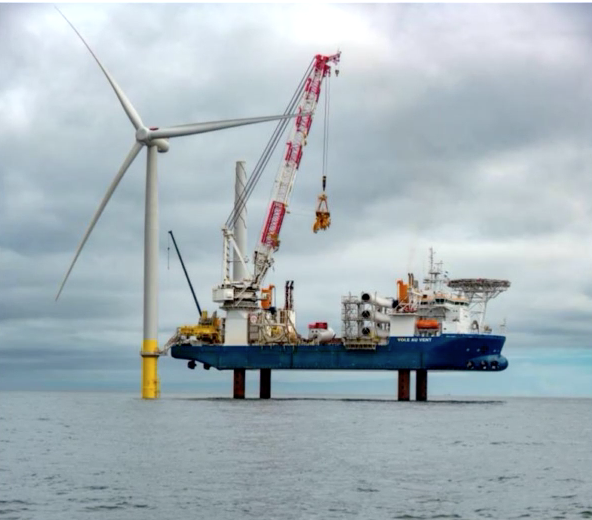Dominion Energy says its $9.8 billion Coastal Virginia Offshore Wind project – the largest in U.S. waters to date – is in mortal danger if a performance guarantee demanded by state officials stands.
Dominion was ordered by the Virginia State Corporation Commission on Aug. 5 to provide a performance guarantee for CVOW to protect consumers from footing higher costs if the turbines don’t perform as well as expected. The guarantee would shield customers from paying more for energy shortfalls below a “net capacity factor" of 42 percent as calculated over a three-year average.
The commission also approved a rate adjustment clause to consumer’s power bills, which will allow Dominion to recover its development costs of the planned 2.6 gigawatt project.
Dominion had estimated its turbines would perform on average at 42 percent of the maximum nameplate capacity of the wind generators. Dominion appealed the guarantee holding it to that performance, asking for more flexibility, and setting off a new comment period for the utility and interested parties.
In a Sept. 29 filing with the commission, Dominion said keeping the guarantee “will prevent the project from moving forward and the company will be forced to terminate all development and construction activities.”
Dominion says $839 million is already invested in the project, which includes two pilot project turbines 27 miles off Virginia Beach, and ongoing construction of the wind turbine installation vessel (WTIV) Charybdis at Brownsville, Texas.
It will be the first U.S. flag, Jones Act-compliant WTIV and is already contracted to serve other U.S. offshore wind projects along with Dominion’s.
“Those investments are at risk of becoming stranded if any operating performance standard remains inconsistent with the law and unreasonable in application,” according to Dominion’s filing.
The three-year, 42 percent average may not account for unusual weather patterns or events, the company says: “It must be recognized that some years are likely to outperform the average and some are likely to underperform it.”
While Virginia environmental groups are generally supportive of renewable energy, some raised concerns to the commission about Dominion’s financial structure for the CVOW.
“Dominion Energy’s utility-owned model for offshore wind guarantees record profits at no risk for its shareholders. All other states developing offshore wind have adopted models that reduce risks to customers,” said Laura Gonzalez, energy policy manager at Clean Virginia, according to a Sept. 21 statement from the group. “It is the regulator’s job to balance monopoly profit motives by adopting common and reasonable standards that will protect Virginians.”
“Dominion customers will cover 100 percent of the project’s development and operations costs, paying an estimated $21.5 billion over the project’s 30-year lifespan, which includes Dominion’s guaranteed rate of return, currently estimated to be $7.22 billion,” according to Clean Virginia.
“As the largest capital investment in Dominion’s history, the offshore wind project will also be one of the most profitable, rewarding shareholders with an estimated $7.22 billion in guaranteed profits,” the group said in its filing with the commission. “If ever triggered, the performance standard will likely have a limited financial impact on Dominion’s bottom line.”
In its filing, Dominion argues its projected return from the project is reasonable.
“At the end of the day, investors funding this $9.8 billion Project over more than three decades will receive a modeled 9.35 percent return on the equity portion of this investment. That is a ‘fair’ rate of return as determined under the law and by this Commission, and one which is not to be arbitrarily reduced by an operational performance guarantee,” according to Dominion’s statement to the commission.





